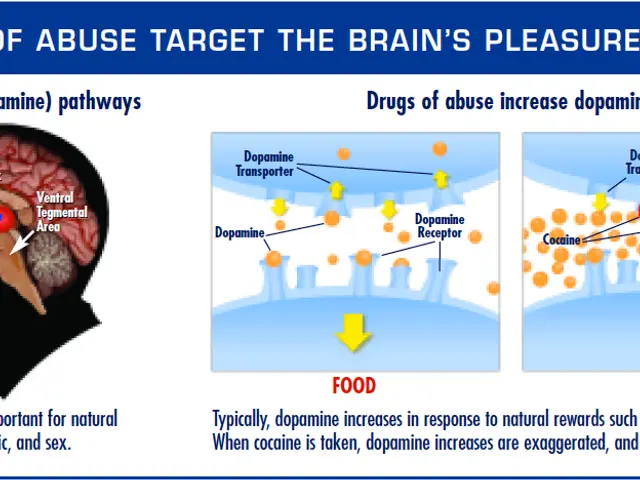Diets Assessed by Experts: Top 9 Diets Ranked in 2017
Diving into the realm of diets, we've got a wide variety of options to choose from, each with its unique focus. From shedding pounds to managing specific conditions, there's a diet for almost every purpose you can imagine.
Let's start with the Atkins diet, a low-carbohydrate approach that focuses on controlling insulin levels in the body. By doing so, this diet tries to make the body burn fat instead of carbohydrates. However, it's important to remember that this diet comes with certain risks and individuals should consult with their healthcare provider before diving in.
Next up is The Zone diet, a balanced approach that aims for an equal ratio of carbohydrates, fats, and proteins in each meal. The goal is to control insulin levels for successful weight loss and body weight maintenance.
The ketogenic diet has seen popularity as a treatment for epilepsy and is also being explored for other uses. It involves reducing carbohydrate intake and increasing fat intake, leading to ketosis and the use of fat as a fuel source. While there are some promising research findings regarding diabetes management and metabolic health, it's essential to be aware of the risks associated with this diet, particularly for those with type 1 diabetes.
Vegetarian and vegan diets play a significant role in the dietary landscape. Vegetarians, who abstain from eating animal-based foods (except for eggs, dairy, and honey), and vegans, who avoid all animal-based products, both have lower body weights, suffer less from various diseases, and typically have longer life expectancies than meat-eaters.
Weight Watchers focuses on weight loss through diet, exercise, and a support network. Founded in the 1960s, it has since grown into a global company offering both in-person and online support.
The South Beach diet was developed by a cardiologist and nutritionist as a response to the low-fat, high-carb diet promoted by the American Heart Association. It emphasizes the control of insulin levels and the benefits of unrefined slow carbohydrates over fast carbohydrates.
The raw food diet involves consuming only uncooked, unprocessed, and plant-based foods, potentially including vegan choices. Four main types of raw foodists exist—raw vegetarians, raw vegans, raw omnivores, and raw carnivores.
Lastly, the Mediterranean diet, originally based on the nutritional habits of people from Crete, Greece, and southern Italy, is one of the most extensively studied diets. Its focus is on consuming lots of plant foods, olive oil, moderate amounts of fish and poultry, and low to moderate amounts of wine. Studies have shown that this diet significantly improves overall health and lowers the risk of chronic diseases.
It's worth noting that a Western diet, high in processed foods, refined sugars, saturated fats, and sodium, significantly increases the risk of various health issues, including obesity, chronic diseases, cognitive decline, and dementia. In contrast, the Mediterranean diet can promote better physical and mental health outcomes and is associated with reduced risks of cardiovascular disease, stroke, and type 2 diabetes. So, it's essential to make educated dietary choices for a healthier, happier life.
- The Atkins diet, a low-carbohydrate approach, tries to make the body burn fat instead of carbohydrates, making it a predictive choice for weight loss.
- The ketogenic diet, despite its popularity in managing conditions like epilepsy, comes with risks, particularly for those with type 1 diabetes, making it important to consult with healthcare providers before adopting it.
- Vegetarian and vegan diets, with their focus on plant-based foods, have been found to lower body weights, reduce the risk of diseases, and extend life expectancies, making them significant options in the health-and-wellness landscape.
- The Mediterranean diet, with its focus on plant foods, olive oil, fish, and moderate amounts of wine, has been shown to improve overall health and lower the risk of chronic diseases, making it a recommendable dietary choice for a healthier life.
- Nutritional science suggests that a Western diet, high in processed foods, refined sugars, saturated fats, and sodium, increases the risk of various health issues, especially obesity, chronic diseases, cognitive decline, and dementia, while the Mediterranean diet can promote better physical and mental health outcomes, thus, emphasizing the importance of making informed and healthy dietary decisions.







